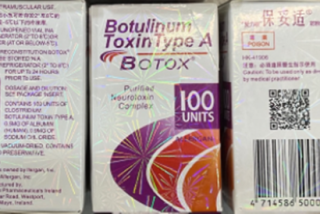Allergan Is Warned on Botox Ads
- Share via
For the second time in less than a year, the Food and Drug Administration has warned Irvine-based Allergan Inc. that advertisements for its anti-wrinkle drug Botox are misleading and should be pulled.
The FDA said Allergan’s ads falsely identify the prescription drug as a cosmetic treatment, fail to reveal details about which wrinkle types it treats and minimize the drug’s risks.
For the record:
12:00 a.m. June 27, 2003 For The Record
Los Angeles Times Friday June 27, 2003 Home Edition Main News Part A Page 2 National Desk 2 inches; 81 words Type of Material: Correction
Botox ads -- An article in Wednesday’s Business section incorrectly attributed a quote to Food and Drug Administration spokeswoman Lenore Gelb. The article was about a letter the FDA sent to Allergan Inc., demanding the company pull misleading ads for its anti-wrinkle drug Botox. A quote said the FDA was “concerned that by continuing to promote Botox in a false and misleading manner these materials are raising significant public health concerns.” The quote came from the agency’s warning letter, not Gelb.
The agency sent a similar warning letter to Allergan in September.
In its latest letter, posted on the agency’s Web site Monday, the FDA instructed the company to immediately stop all print ads and other promotional activities that contain the misleading claims and to respond in writing within 10 days.
FDA spokeswoman Lenore Gelb called the warning letter a “very serious event,” and said the agency was “concerned that by continuing to promote Botox in a false and misleading manner these materials are raising significant public health concerns.”
Wall Street seemed largely unconcerned. Allergan shares fell 14 cents Tuesday to $78.12 on the New York Stock Exchange.
Allergan spokeswoman Christine Cassiano said company executives “believe we can easily address the FDA’s requests with minor changes.”
In the letter, the FDA said Allergan’s promotional ads misleadingly suggest that Botox is effective in temporarily combating frown lines, something that extends beyond its approved use as a treatment for easing a specific wrinkle that develops between the eyebrow and forehead.
Botox, an injectable drug that was originally approved to combat various muscle disorders, became a favorite of cosmetologists to treat wrinkles in April 2002. Allergan’s first-quarter net income rose 60%, as Botox sales jumped 39% to $123.1 million, compared with $88.6 million a year earlier.
A purified form of a deadly toxin called botulinum, Botox has been used for two decades to treat rare muscle disorders, such as blepharospasm, a condition that causes excessive blinking and can force patients’ eyes shut.
Separately on Tuesday, the FDA ordered drug giant GlaxoSmithKline to quit running a series of radio and newspaper ads that call its allergy spray Flonase a cost-effective alternative to expensive allergy pills. The ad campaign urged allergy sufferers to ask their doctor about Flonase, a nasal spray, instead of antihistamine pills such as Allegra and Zyrtec.
The FDA said the ads falsely imply that Flonase is fully interchangeable with the other drugs -- when in fact, it relieves only nasal symptoms and the pills can relieve itchy allergy-afflicted eyes too.
The FDA also told Novartis Ophthalmics Inc. that advertisements for its Zaditor eyewash are illegal because they exaggerate the allergy drug’s effectiveness. The FDA asked Novartis Ophthalmics to immediately discontinue all advertising for the drug and submit a written response by July 2.
Times staff writer Ronald D. White contributed to this report, and Times wire services were used in compiling it.
More to Read
Inside the business of entertainment
The Wide Shot brings you news, analysis and insights on everything from streaming wars to production — and what it all means for the future.
You may occasionally receive promotional content from the Los Angeles Times.










